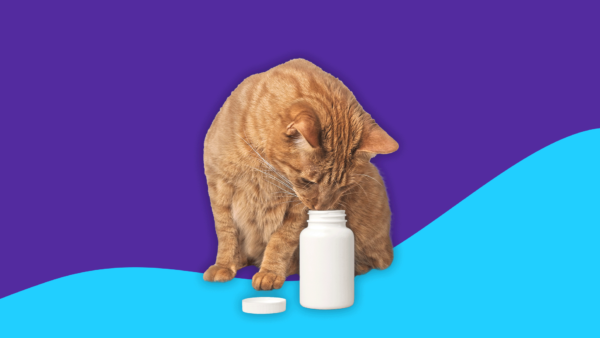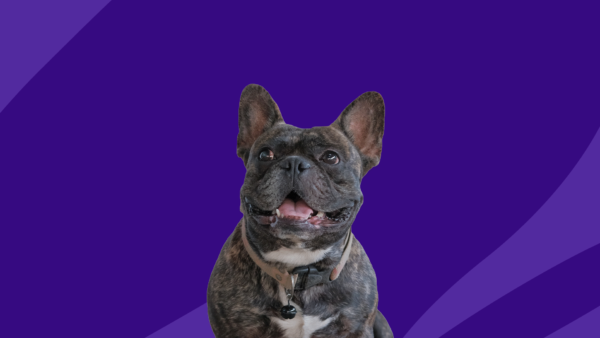Just like their human best friends, dogs can feel anxious and even depressed sometimes. Also like humans, the medication trazodone is sometimes prescribed for dogs who aren’t their usual happy selves. In humans, this medication treats depression and insomnia—thanks to its sedative effects. Here is what you should know about using this Rx in veterinary medicine, including its use, dosage, and side effects.
What is trazodone used for in dogs?
Trazodone, also known by its brand names Desyrel and Oleptro, is an antidepressant. It works by increasing serotonin levels in the central nervous system. For dogs, it’s primarily used as a treatment for anxiety disorders. “Some veterinarians will prescribe your dog a mild sedative or anti-anxiety medication if they have noise phobias, separation anxiety, or other short-term calming needs,” says Chyrle Bonk, DVM, a veterinarian at Senior Tail Waggers.
Trazodone is a serotonin antagonist reuptake inhibitor (SARI), which means it helps your brain use the neurotransmitter serotonin correctly when you are depressed or anxious. It also has a sedative effect.
“Sedatives are commonly prescribed for dogs before anesthesia, for anxiety or noise phobia such as thunderstorms and fireworks,” Sara Ochoa, DVM, a veterinarian at Senior Tail Waggers.
“Trazodone can [also] be used as a behavior-modifying medication. This can help make aggressive dogs more calm and easier to treat at the vet clinic or when getting groomed.” If a medication used off-label helps your dog feel better on a day they’d otherwise be miserable—like the Fourth of July, during a thunderstorm, for nail clippings, or before vet visits—many veterinarians and pet parents think that’s the right move.
However, it’s important to note that while the drug you are prescribed is the same as the one your dog would be given, you should never give your dog trazodone without consulting your veterinarian first. You need to give your vet a complete health history so they can determine if trazodone is right for your pet and, if so, what dosage would be appropriate.
Trazodone dosage for dogs
Trazodone comes in a short-acting or long-acting tablet and is taken with water. If needed, the medication can be compounded into a liquid for dogs and cats who have trouble taking pills. The doses range from 50 mg to 300 mg and can vary depending on body weight and the condition for which it is being prescribed. It can be used daily for more generalized anxiety or as needed in specific situations.
“The dose of trazodone that is correct for your dog will depend on the dog’s weight and what conditions you’re trying to treat,” Dr. Bonk says. A dog who is very anxious might not seem particularly sedated on a “usual” dose of trazodone for their weight and may need a larger dose to make it through a medical procedure without being stressed or aggressive.
Vets recommend the following when administering trazodone:
- Give trazodone with food to avoid nausea.
- Administer the dose on an as-needed basis 30 minutes to an hour before the stressful event or phobia, so it has time to kick in.
- Expect a couple of weeks for the medication to reach full effect for long-term uses such as separation anxiety or behavioral disorders.
Your vet will give you specifics for what to expect based on your pet’s dose, size, and temperament. You will need to monitor your dog’s reaction to the drug closely to see what works best for them. The desired effect of trazodone is that your pet will feel less anxious, especially in stressful situations. Hopefully, your pet will feel calm and relaxed from trazodone, which will help their overall well-being.
Is trazodone safe for dogs?
Trazodone is prescribed very frequently because it is a safe and effective medication for dogs who have anxiety and need to calm down for medical procedures or stressful events. However, there are some drug interactions with trazodone. Medications that can interact with trazodone include:
- Certain antibiotics
- Some antidepressants, like monoamine oxidase inhibitors (MAOIs)
- Pain medications and anti-inflammatories
- Heart medications
- Aspirin
- Antifungals, like ketoconazole
- GI medications
- Diuretics
Be sure to tell your vet about all of the medications and supplements that your dog is taking before they prescribe trazodone. Trazodone can be used with some selective serotonin reuptake inhibitors (SRRIs) like fluoxetine and benzodiazepines.
Trazodone for dogs side effects
Like any medication, trazodone can have side effects. Most are not serious, but some you should keep an eye out for and tell your veterinarian if your pet is experiencing them as they can be a sign of drug interaction or overdose.
Possible side effects of trazodone include:
- Anxiety
- Depression
- Aggression
- Sedation or drowsiness
- Lethargy
- Vomiting
- Diarrhea
- Ataxia (drunken gait)
- Changes in appetite
- Dilated pupils
Fortunately, Dr. Bonk says, “These side effects are very rare when the medication is given at the correct dose and typically go away within 24 hours.”
If your dog has a bad reaction to trazodone, there are alternatives. Some other sedatives your vet might prescribe include:
What happens if I give my dog too much trazodone?
Unfortunately, overdose is possible when it comes to sedatives like trazodone. Usually, too much trazodone leads to adverse effects like too much sedation, which will look like they are “drunk” from taking too much of the medication. That’s why it’s so important to always follow your vet’s dosage recommendation, and not simply give your pet some of your prescription.
There are some serious side effects from taking too much trazodone. “When given in too high amounts or with other similar medications, trazodone can lead to serotonin syndrome that can cause vomiting, diarrhea, a high body temperature, seizures, drooling, incoordination, paralysis, coma, and even death,” says Dr. Bonk. If you suspect your dog is having an overdose of trazodone or notice signs of serotonin syndrome, call your veterinarian or take your dog to an emergency pet clinic for further advice and treatment.
Since trazodone is a human medication, you can use SingleCare to save when you fill it at your regular pharmacy. Simply search for a coupon on singlecare.com, adjust for the dosage, location, and quantity, then show your pharmacist the coupon when you pick up your pet’s Rx.
RELATED: Can I save on medication for my pets?











